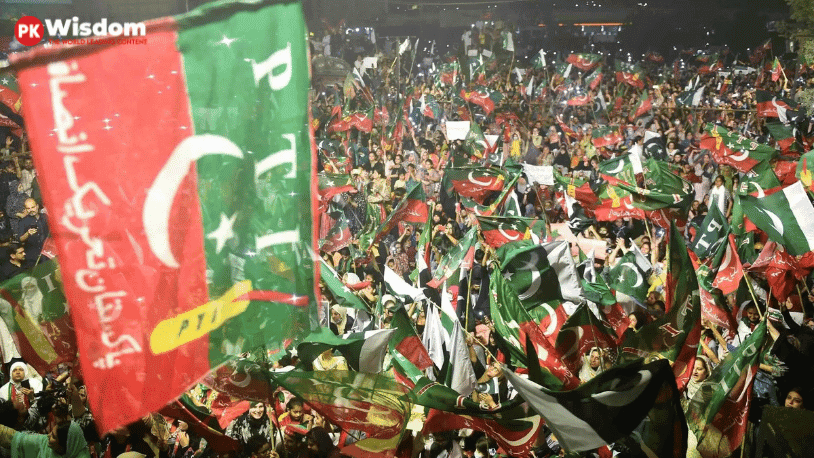February 2024 finds Pakistan on the cusp of Elections 2024, an event shrouded in uncertainty fueled by the extraordinary circumstance of imprisoned former Prime Minister Imran Khan campaigning for his party, Pakistan Tehreek-e-Insaf (PTI), from his jail cell. Barred from contesting due to legal challenges and stripped of his party’s iconic “bat” symbol, Khan, nicknamed “Prisoner No. 804,” faces an uphill battle. Can he defy the odds and lead his party to victory?
Challenges and Obstacles
Khan’s path to victory is fraught with challenges:
- Legal Impediments: For the reason of his convictions, he is disqualified from running for office. Amid the ongoing appeals process, legal ambiguities loom.
- Imprisonment: His physical confinement restricts public interaction and campaigning, both of which are vital to his electoral success.
- Symbolic Loss: The Election Commission’s decision to disallow the emblematic cricket bat symbol of the PTI may have had an impact on the organization’s brand recognition.
- Tight Race: Preliminary polls indicate a close contest, which gives rise to apprehensions regarding potential post-election disputes and acts of violence. Transitions that occur peacefully and in accordance with democratic principles are vital.
- Military’s Role: The military’s position and prospective involvement are still uncertain, thereby introducing an element of unpredictability. Recognizing the impact that it has on the process is crucial.
Khan’s Strategies and Support
Despite the hurdles, Khan and his party aren’t giving up:
- Narrative Building: Khan portrays himself as the target of a political vendetta, eliciting both pity and indignation from his followers.
- Social Media Blitz: PTI mobilizes its youth demographic, which is well-versed in digital technology, in opposition to detrimental narratives.
- New Faces and Alliances: The political party recruits new candidates and pursues strategic alliances in an effort to expand its appeal beyond Khan’s fundamental support base.
- Anti-Establishment Sentiment: Khan strategically capitalizes on the prevailing discontent among the general public regarding the established political system, thereby possibly enticing crossover voters.
Can Khan Win from Jail? An Open Question
Several factors could influence Khan’s chances of influencing the outcome, even if he cannot become Prime Minister himself:
- PTI’s Performance: The PTI’s performance will be evaluated based on its candidate selection, campaign strategy, and capacity to galvanize Khan’s support base.
- Public Sentiment: Voters may be influenced to support the PTI by anti-establishment sentiment and Khan’s personal popularity.
- Legal Developments: Any modifications to the legal framework or alterations in Khan’s disqualification status have the potential to substantially influence the final result.
Public Opinion and Unpredictability
The forthcoming 2024 Pakistan elections are surrounded by a palpable sense of unpredictability, largely attributable to the dynamic and intricate terrain of public sentiment. Recent polls indicate that the PML-N and Imran Khan’s PTI will compete in a close race; however, a limited perspective can be gained from these glimpses alone due to the following factors:

- Volatility of Public Opinion: Historical evidence suggests that Pakistani public sentiment is susceptible to sudden changes, which can be attributed to a multitude of factors including charismatic leaders, narratives disseminated on social media platforms, and economic vicissitudes. Because of this, placing exclusive reliance on pre-election polls is precarious, given that sentiments may shift in the days leading up to the election.
- Regional Variations: Regional disparities in public opinion are notable in Pakistan, as each area confronts distinct socio-economic obstacles and exhibits particular political inclinations. These regional disparities are frequently obscured by national surveys, which complicates the task of forecasting outcomes in particular constituencies.
- The “Silent Electorate”: A considerable proportion of the electorate in Pakistan, especially residing in rural regions, might abstain from openly casting ballots or publicly articulating their viewpoints. The influence that this “silent electorate” can exert on election outcomes is unexpected, thereby increasing the degree of unpredictability.
Beyond the Binary
While the focus rests on a potential Khan victory, other scenarios exist:
- PTI win without Khan: The PTI may still secure victory on the basis of its policies and Khan’s legacy, notwithstanding his ineligibility to serve in office.
- Coalition government: In a system of intricate power dynamics, no party could secure a distinct majority and thus be required to form a coalition.
- Upsets and Surprises: The emergence of smaller political parties or independent candidates may have a substantial impact, reshaping the political environment.
Read more: Pakistan Elections 2024: Which are the Main Political Parties?
The Stakes and Potential Outcomes
The elections 2024 hold immense significance for Pakistan’s future:
- Stability and Governance: For democratic consolidation and peace, a credible and impartial election process is vital.
- Economic Landscape: The trajectory of a nation’s development will be determined by the economic policies implemented by the victor.
- Regional and International Relations: The new government may have an effect on Pakistan’s foreign policy stance.
Conclusion
As Pakistan approaches the Elections 2024, the upcoming weeks will be critical. It remains to be seen whether Khan’s charisma, which is conveyed via AI-generated messaging and the voices of his proxies, can surmount the formidable obstacles he encounters. The upcoming elections possess the capacity to significantly alter the political terrain of Pakistan, carrying substantial ramifications for the stability and future course of the nation.


